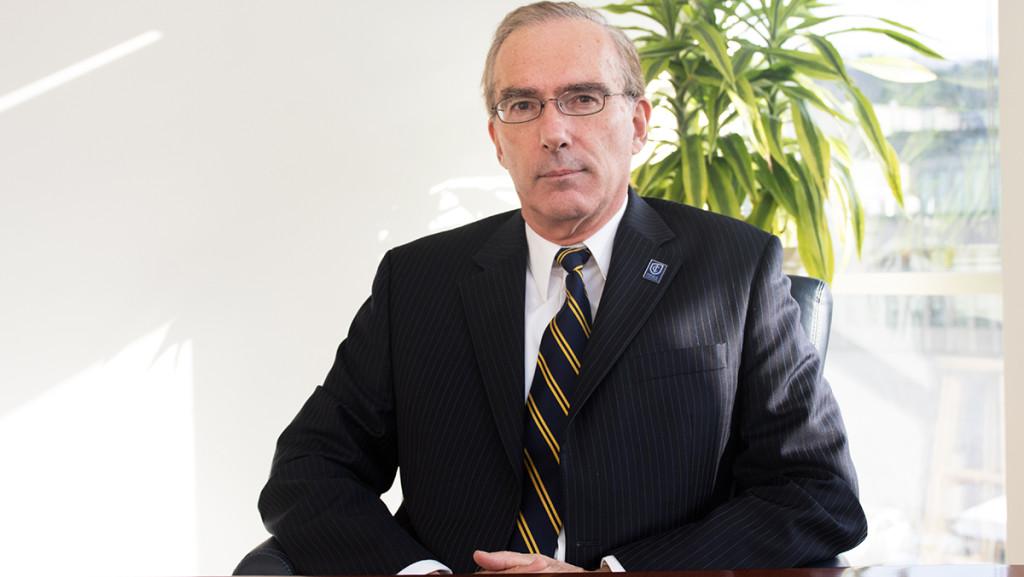Ithaca College’s “IC 20/20” strategic plan will wrap up in Spring 2017 — almost four years earlier than the timeline from which it took its name projected — allowing the next president of the college to implement their own larger vision for the college.
“We’ve completed most of the plan, noticeably, before the year 2020, and secondly, it seems only fair to allow the new president to come in next fall and, in collaboration with the campus, start a new strategic planning process, rather than be tasked with cleaning up, or, let’s say, finishing, the last of the IC 20/20 initiatives,” President Tom Rochon said in an interview with The Ithacan on Oct. 26. “It’s appropriate over the course of this academic year to tie a ribbon around IC 20/20, celebrate the accomplishments, acknowledge the things that didn’t get done, and then the institution can move on.”
IC 20/20 is the central strategic vision for the college, approved by the Ithaca College Board of Trustees in 2011, that includes the Integrative Core Curriculum, global learning opportunities, residential learning programs, civic engagement and service learning, student and alumni mentoring, advising for first-year students, diversity programming, honors programming, alternative learning models and degrees, and a commitment to faculty excellence. All of these initiatives were supposed to be in place by 2020, the plan’s namesake.
According to reporting by The Ithacan, to date, the Honors Program has extended to an all-college program, but is dealing with issues of lack of administrative of support. The Office of Civic Engagement was established, but has also dealt with staffing and support issues. A global learning center was established in New York City with ICNYC; however, a China campus was never created, and study abroad programs were cut by over 70 percent in Spring 2015.
The ICC is in its fourth year; however, concerns remain among students and faculty about the availability of courses and the effectiveness of the use of themes and e-portfolios, among others. The First Year Residential Experience is taking place in on-campus housing, but has suffered from low attendance.
The Center for Faculty Excellence has been established. IC Mentor Connect website was piloted in 2015 to enhance mentoring, and the Academic Advising Center was established. Diversity initiatives have also been rolled out since the creation of IC 20/20, including a satellite office for the Office of Public Safety and diversity trainings for faculty, staff and alumni volunteers, but those only came after major campus protests.
Questions still remain regarding the progress on alternative learning models and degrees.
“The most significant initiatives of IC 20/20 have been accomplished: things ranging from creating the academic advising center to creating the Center for Faculty Excellence, to creating the center for community engagement, ICNYC,” Rochon said. “I think you can recognize all of these represent enhancements of the student educational experience, and all of them took investments.”
Despite remaining issues with some of the IC 20/20 initiatives, Tom Swensen, chair of the Faculty Council and professor and chair of the Department of Exercise and Sport Sciences, said these problems will be resolved and campus community members will still advocate for developments in these initiatives, even after the current president leaves.
“The Honors Program, civic engagement — there were some hiccups last year,” Swensen said. “We’re still working our way through those issues. … They are important institutional priorities, people see the benefits in them. Just because we’re saying we’ve done as much as we can with IC 20/20 now without basically doing another round of strategic planning, … that doesn’t mean that these things will not continue to be priorities.”
Swensen said he thinks many of the current initiatives will continue to be important objectives to the incoming president.
Another purpose of IC 20/20 was to establish long-term security for college’s sources of revenue — student fees, donations and endowment income, according to the IC 20/20 “final vision” in 2011. While offering attractive features to enhance the college experience and instituting measures to minimize the number of students dropping out of the college, IC 20/20 sought to foster a reliable group of future alumni donors for its current students.
The college budgeted more than $23 million for IC 20/20 between 2010–11 and 2015–16, the last year the data is available, out of the more than $1.3 billion total budgeted over that time.
Diane Gayeski, dean of the Roy H. Park School of Communications, said this decision was made known to the deans recently, as the board of trustees discussed it at the board’s October meeting last week. She said an agenda item for the board was to discuss the presidential transition.
“Every president has the expectation and certainly the right to start her or his new strategic plan,” Gayeski said. “It wouldn’t be fair to just sort of hand this to someone new and say, ‘You have to live this out for another three years.’ It seems completely logical.”
Gayeski said she is not worried that this will affect the goals or directions of the individual schools, as the schools set goals on a smaller level. She said it is not impacting anything currently underway in the Park School.
Junior Marieme Foote, president of the Student Governance Council, said she is more focused on the new president than Rochon’s decision to discontinue IC 20/20.
“I’m just curious to see what the next president wants to do,” she said. “At this point, Rochon is on the transition out, so I’m more curious what the new president will bring and what new vision he will have for the college.”
News Editor Aidan Quigley, Staff Writer Justin Henry and Staff Writer Max Denning contributed reporting to this article.








